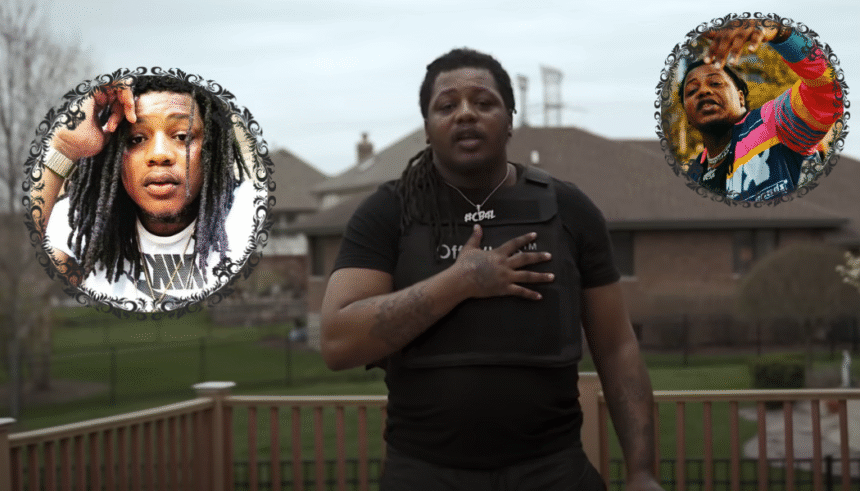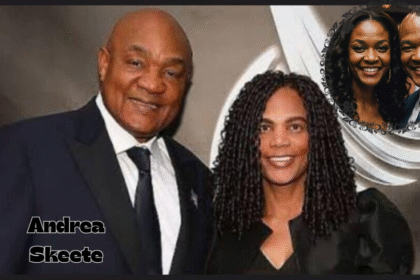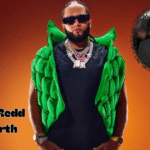The name FBG Duck holds deep significance within Chicago’s music culture. Known for his raw storytelling and fearless lyrics, he emerged as one of the most authentic voices of the city’s drill scene. Behind the fame, however, was a young man named Carlton Dequan Weekly, whose life reflected both the promise and peril of chasing success amid Chicago’s turbulent streets. His story is one of ambition, hardship, and the lasting power of music.
Early Life
FBG Duck was born on December 6, 1993, in Chicago, Illinois. He grew up in the city’s South Side, an area known for its creativity and also its struggles with poverty and gang violence. Raised by his mother, LaSheena Weekly, Duck faced many challenges early on. His childhood was marked by the harsh realities of urban life, but it also instilled in him a determination to make something of himself.
Music became his outlet, a way to process everything he saw around him. As a teenager, he started writing and performing songs with friends, many of whom would later form the rap collective Fly Boy Gang (FBG). His upbringing wasn’t easy, but it shaped the artist who would go on to speak so honestly about the world he came from.
Growing Up in Chicago

Life in Chicago’s South Side shaped FBG Duck’s worldview. He witnessed the challenges that came with living in neighborhoods affected by crime and lack of opportunity. Despite those hardships, Duck remained connected to his family and community. His older brother, FBG Brick, also pursued music but was tragically killed in 2017 — a loss that deeply affected Duck.
Tragedy wasn’t new to his family. In 2014, his younger sister died in a fire, another painful chapter that strengthened his emotional depth as an artist. These experiences would later become central themes in his lyrics, as he turned personal pain into creative expression.
Career Beginnings
Duck’s first steps into music began in the early 2010s when he joined Fly Boy Gang, a group of local rappers pushing to make their voices heard. They gained attention through YouTube and local performances, producing gritty, unfiltered songs that reflected everyday life in their neighborhoods.
His early tracks, such as Right Now and Gang Anthem, showed flashes of lyrical power. His bold delivery and straightforward lyrics quickly resonated with fans of Chicago’s emerging drill movement. Duck’s talent wasn’t in polished production but in honesty — his ability to describe real experiences without glorifying them.
Rise to Fame
In 2018, FBG Duck released his biggest hit, “Slide”, a song that skyrocketed his career. The track combined hard-hitting beats with street authenticity, earning millions of views on YouTube and widespread recognition. It was more than just a viral hit — it was a declaration of identity.
The success of “Slide” brought attention from record labels, including Sony Music’s distribution division. His fame grew beyond Chicago, and his voice started to reach a national audience. Yet, with fame came pressure — balancing music, family, and safety in a city where public success could also make someone a target.
The Chicago Drill Movement
To understand FBG Duck, it’s important to understand drill music. Born in Chicago’s South Side around 2011, drill is known for its aggressive beats, vivid storytelling, and reflections of street life. Artists like Chief Keef, Lil Durk, and King Von became major figures in the genre.
Duck was part of that same wave but carved out his own sound. He was known for his deep voice, sharp lyrics, and his refusal to sugarcoat reality. His music represented the perspective of those often ignored in mainstream culture — young people navigating survival, loyalty, and dreams in tough environments.
Personal Life and Character
Behind the stage name, Carlton Weekly was a son, brother, and father. Reports suggest he had several children and was known to care deeply for his family. Friends described him as funny, protective, and more thoughtful than his public persona suggested.
Though his lyrics often reflected violence, he also expressed hope and the desire to move beyond it. Those close to him said he wanted to use his success to uplift his loved ones and eventually leave behind the dangers of the streets.
His physical appearance matched his larger-than-life personality — tall, strong build, confident posture, and an unmistakable presence. He often wore designer clothes, flashy jewelry, and carried himself with charisma. But beneath that image was someone shaped by hardship and ambition.
Feuds and Street Conflicts
Chicago’s drill scene has long been intertwined with real-life rivalries, and FBG Duck was no exception. He had conflicts with rival rap groups, many of which spilled over into public social media exchanges. While some saw this as part of the culture, it often had dangerous consequences.
Duck’s honesty in his lyrics sometimes reignited old tensions, but he also spoke about wanting peace. In interviews, he mentioned that the ongoing violence wasn’t worth the losses, hinting at a deeper maturity than the controversies surrounding him.
Tragic Death
On August 4, 2020, tragedy struck. FBG Duck was shot and killed in Chicago’s Gold Coast, one of the city’s upscale districts, while shopping for his girlfriend. He was only 26 years old. The incident shocked fans and the wider music industry.
News outlets reported that the shooting was connected to ongoing gang rivalries, a grim reminder of how deeply violence had become tied to Chicago’s music culture. The loss of Duck wasn’t just another headline — it was a reminder of how fragile success can be when talent and environment clash.
Aftermath and Investigation
Following his death, a federal investigation led to the arrest of six individuals accused of being involved in the attack. Authorities described the incident as part of a larger pattern of gang retaliation. For Duck’s family, particularly his mother, the arrests were a step toward justice but could never replace what was lost.
Fans continued to mourn him online, sharing his songs and personal memories. Candlelight vigils, murals, and tribute tracks appeared across Chicago, turning grief into remembrance.
Legacy and Impact
FBG Duck’s influence on drill music remains undeniable. His songs captured the pulse of his generation — raw, emotional, and brutally honest. Even after his death, his music continues to inspire upcoming artists who see him as a symbol of resilience.
His story also sparked broader discussions about the dangers facing young rappers in Chicago and the need for safer, more supportive paths for talent to grow. In many ways, Duck’s legacy represents both the potential and the peril of the drill movement.
Net Worth and Social Media
At the time of his death, FBG Duck’s net worth was estimated between $1 million and $3 million, based on streaming royalties, performances, and YouTube revenue. His channel had hundreds of thousands of subscribers, and his songs have collectively garnered millions of views.
He was active on Instagram and Twitter, often interacting directly with fans and promoting his latest projects. Even after his passing, his social media accounts remain places where fans share memories, lyrics, and tributes.
Conclusion
The story of FBG Duck is a reflection of modern American hip-hop — a blend of hope, hardship, and humanity. He rose from difficult beginnings to become a respected artist, giving voice to a community often misunderstood. His music remains alive in the hearts of those who saw truth in his words.
Buzzlift: Coco Jones and Donovan Mitchell: A Love Story Beyond Fame
Though his life ended too soon, Carlton “FBG Duck” Weekly left behind a message that echoes beyond his songs: the struggle to rise above circumstances and the enduring power of authenticity. His name stands not just for a genre, but for a life lived with courage, honesty, and an unfiltered voice that continues to speak long after he’s gone.






